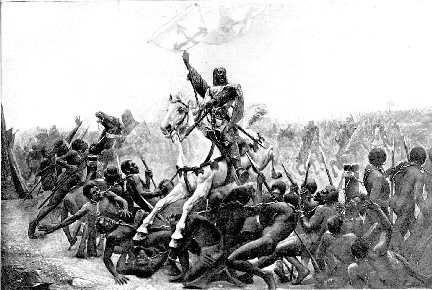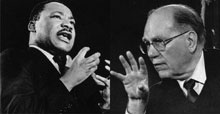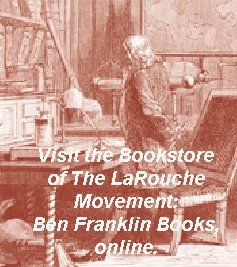|
...... .............
|
Published: Tuesday, Mar. 14, 2006
|
Volume 5, Issue Number 11
|
|
|
|
|
|
|
|
|
|
|
|
|
This Week You Need To Know:
|
Here are Lyndon LaRouche's remarks to a private seminar in Berlin on March 6.
First of all, on the Iran crisis, the probable remedy in the short term, will come from negotiations between Russia and the government of Iran, because there is no other visible intermediary at this time which could probably do the job.
|
|
What we're looking for, is a time-buying operation. This was very unfortunate, bringing this crisis on from the United States and Britain, at this time, upon Iran. Iran had just had an election. It had things, internal affairs, to sort out after the election. And to bring this on, which was totally unnecessary, has created a danger for civilization, which Europe, in general, could not handle, and which is a problem for us in the United States itself, caused by Cheney.
|
|
CURRENT SUBSCRIBERS:
LOG IN HERE, OR USE THE LINKS BELOW, TO ACCESS THIS ISSUE.
|
|
|
Included
for the
Duration: |
|
|
Recent LaRouche Webcasts*
|
| "Make a Platonic Revolution to Save Our Civilization" |
Feb. 23, 2006 |
"Rebuild a Looted U.S. Economy"
video: Baltimore: from Industrial Powerhouse to Death Zones |
Jan. 11, 2006 |
"The Tasks Before Us in the Post-Cheney Era"
Videos: US Dams, US Nuclear Plants |
Nov. 16, 2005 |
| "Rediscovering America: The Lessons of LaRouche's Famous Oct. 12, 1988 Forecast" |
Oct. 12, 2005 |
|
|
Sept. 16, 2005 |
Emergency Webcast,
"Pulling This Nation Together Now!"
|
Sept. 3, 2005
|
"LaRouche Addresses Urgent Changes in Economic and Monetary Policy"
|
Short video (WMA format)
|
June 16, 2005
|
|
|
April 7, 2005
|
|
|
This Week in American History
On March 14, 1794, Eli Whitney received a patent on an invention which he had designed and built in ten days as a favor to his hostess. But the cotton gin ("gin" being a contraction of "engine") yielded much aggravation and very little profit for its inventor, and Whitney turned his creative energies elsewhere, to the great benefit of the United States.
Whitney grew up on a Massachusetts farm where he spent his spare time repairing violins, working with iron, and, during the American Revolution, making nails in his father's small workshop. He earned enough money by the age of 23 to pay for tuition at Yale, where he studied law, but preferred the science and mathematics courses. He supplemented his earnings by repairing the college's scientific apparatus and equipment. One of these was an orrery which had been ordered by Yale's president Ezra Stiles from London. It had arrived damaged and was about to be shipped back for repairs, but Whitney spent a week making special tools, and had it working perfectly.
After his graduation in 1792, Whitney needed time to prepare for the bar, so he accepted a tutoring position in Georgia. On the ship taking him there, he met Catherine Greene, the widow of Revolutionary War General Nathanael Greene, who was returning with her children to Savannah. When his tutoring job did not materialize, Whitney was invited to the Greene home, where he studied his law books and made himself useful by repairing farm implements. Many of General Greene's former officers still congregated at the Greene home, and they talked about the difficulty of separating green-seed cotton fiber from its seeds.
Mrs. Greene told them that Whitney could solve any mechanical problem, and so, to please her, he built an efficient cotton gin. Formerly, it had taken a full day to produce a pound of cotton by separating the seeds by hand. With the improvements he added by April of 1793, Whitney's gin could produce 50 pounds of cleaned cotton in a day. Greene's former officers were ecstatic, and began expanding their cotton fields, while Whitney planned to continue his law studies. But Phineas Miller, the Greenes' plantation manager, persuaded Whitney to patent the gin, and to go into partnership with him to produce it.
Even before Whitney left Savannah to apply for a patent and to build a factory, his gin had been carefully scrutinized by others and imitations began to appear. Nevertheless, Whitney went to New Haven, Conn., erected a factory, and trained the workers. But epidemics of scarlet fever and yellow fever swept through New Haven in the summer of 1794, forcing Whitney to close his shop. Then, in 1795, a fire broke out which destroyed almost everything. Whitney rebuilt, but he was making little profit on his invention due to the many pirated versions, and, coming from a farm family, he did not have cash reserves to draw on.
But in 1798, war with France seemed to loom on the horizon, and the American government was signing contracts for musket production with private manufacturers. The United States had set up a Federal armory at Springfield, Mass. in 1794, and another at Harpers Ferry, Va. in 1798, but production was slow because guns were mainly hand-crafted objects. Therefore, in the military emergency, the Administration of President John Adams was placing musket orders with as many private contractors as possible.
Although he had never made a firearm, Eli Whitney tendered a bid on June 14, 1798 to produce 10,000 "stands of arms" (a musket and its bayonet and ramrod) to be delivered within 28 months at a cost of $134,000. This was an unheard-of number of muskets in an incredibly short period, and it represented a conscious government investment in a new method of production. Whitney's coadjutator in this plan was Vice President Thomas Jefferson.
When Jefferson served as Ambassador to France during 1785-1789, he had witnessed the production system of interchangeable parts for firearms which had been designed by Honoré Blanc. Jefferson had tried everything in his power to get Blanc to emigrate to the United States, but had failed. Whitney, too, envisioned a new method of production which would involve an assembly line with machines run by water power, production tasks broken down into their component parts, unskilled workers trained to use the machines, and the milling of interchangeable parts so that guns could be quickly and easily made and repaired.
Whitney realized the difficulties involved when he met with Jefferson, but he was convinced that it eventually could be done. In his bid, he wrote that he proposed to manufacture guns by a new method, his aim being "to make the same parts of different guns, as the locks, for example, as much like each other as the successive impressions of a copper-plate engraving." The difficulty was, Whitney said, that "A good musket is a complicated engine and difficult to make—difficult of execution because the conformation of most of its parts correspond with no regular geometrical figure."
Full article on separate page...
|
|
Latest From LaRouche
Lyndon LaRouche was interviewed by Talksport Radio's James Whale on March 9, 2006. Talksport, which bills itself as "the UK's number one commercial radio station," last interviewed LaRouche on Aug. 1, about Cheney's "Guns of August" nuclear war threat against Iran.
|
|
InDepth Coverage
|

|
|
|
Strategic Studies:
Blair and U.S. Accomplices Push Anti-Islam Crusade
by Jeffrey Steinberg
On March 6, Lyndon LaRouche addressed a private gathering of prominent local figures in Berlin, Germany. The subject of his remarks was the so-called 'Iran crisis.' After reviewing the actual strategic crisis, posed by the intersection of the Anglo-American drive to provoke a needless military confrontation with Iran—to trigger an all-out war against the entire Islamic world, and the end-phase breakdown of the post-Bretton Woods 'globalized' floating-exchange-rate speculative financial system—LaRouche concluded on a note of great optimism, that challenged his immediate audience and reverberated overnight in policymaking circles around the world...
LaRouche: Iran Is Not the Problem; We Must Defeat Globalization
Here are Lyndon LaRouche's remarks to a private seminar in Berlin on March 6.
Documentation
Foreign Minister Lavrov: 'Russia in Global Politics'
Moskovskiye Novosti (Moscow News), a weekly Russian newspaper, on March 3, 2006 published this article by Russian Foreign Minister Sergei Lavrov. An unofficial translation issued by the Russian Ministry of Foreign Affairs is published here.
Berlin Seminar:
Deeper Strategic Realities Behind the 'Iran Crisis'
A private EIR seminar in Berlin on March 2 was the occasion for a lively debate on what to do about the world strategic and economic crisis. Discussion focussed on what really lies behind the London-steered drive for war against Iran; the viability of the Nuclear Non-Proliferation Treaty (NPT); the superiority of the American System of politicaleconomy over the European model of independent central banking; the history of the current 'imperial Presidency' in the United States; and the relationship between moral principle and law.
International:
In Israeli Elections, It's Shultz/Cheney vs. Sanity
by Dean Andromidas
After the victory of Hamas in the recent Palestinian elections, George Shultz and his crony, Vice President Dick Cheney, are taking no chances with the upcoming Israeli elections. They are doing what they can to ensure that a government comes to power over which they can exercise control, and when necessary, use it to strike against Iran, or otherwise start a new Middle East war.
Fact vs. Fiction in The 'Iran Crisis'
by Muriel Mirak-Weissbach
If the U.S. and U.K. neo-cons lied to get into the Iraq War,why shouldn't they lie to prepare a military strike against Iran? OnMarch 8, British and American war mongers went into overdrive in their rush to dupe public opinion that the issue of Iran's nuclear program is swiftly on its way to being declared a casus belli by the United Nations Security Council. Nothing could be farther from the truth. Consider the facts, and then the lies.
Book Review
Gödel and Einstein: The War Against Empiricism
by Mike Billington
Incompleteness: The Proof and Paradox of Kurt Gödel
by Rebecca Goldstein
New York: W.W. Norton Co., 2006
224 pages, paperbound, $13.95; hardcover, $22.95
Rebecca Goldstein's remarkable book on the life and work Kurt Gödel is a very useful contribution to a very old debate, and is even a call to arms in some respects, for the world re-engage in that debate.
Economics:
RECONSTRUCTION FINANCE CORPORATION
How Roosevelt's RFC Revived Economic Growth, 1933-45
by Richard Freeman
The most crucial element of the American System, is the role of Federal credit in promoting the investment in development and maintenance of essential public elements of the nation's basic economic infrastructure, while promoting long-term investment in private entrepreneurial ventures of a type which are to be desired in the general interest. This action is premised on the crucial, constitutional principle of our system, that the creation and issue of legal currency, is a monopoly of the Federal government. This is also the case in practice when, as under Franklin Roosevelt's Presidency, devices such as the Reconstruction Finance Corp. (RFC), were used as a vehicle for accomplishing this result.
—Lyndon H. LaRouche, Jr.,
'Deficits as Capital Gains: How to Capitalize a Recovery,' EIR, Jan. 27, 2006
Mittal-Arcelor Steal: Behind the Fairy Tale
by Jacques Cheminade
Mr. Cheminade is the pre-candidate for President of the Solidarity and Progress party in France. This abridged version of his article has been translated from French.
'An Indian ogre, Mittal Steel, has launched the biggest hostile takeover bid in the history of the European steel industry, to grab hold of European giant Arcelor. A plum industry may thus fall into the lap of a third world, familyrun group.' Those lines are the children's fairy tale version recounted by mass media, concerning a gigantic financial operation that, in its initial stage, represents roughly 18.6 billion euros, with billions more to come...."
'Locust Funds' Seizing German Housing Sector
by Rainer Apel
The big run by the international 'hot money' crowd on Germany's real estate and its public-housing sector in particular, is heating up. 'Super Returns,' the theme of a conference in Frankfurt on Feb. 20, of several hundred hedge funds, private equity, and other funds, indicates their expectations: generating giant revenues from big shares of public housing which are bought at a favorable price from cash-strapped municipalities.
National:
Bush's Budget Is Another War and Austerity Budget
by Carl Osgood
The scandal-ridden Cheney-Bush Administration sent up to Capitol Hill, on Feb. 6, another 'guns, not butter' budget for Fiscal Year 2007. It targets dozens of social safety net and public health and safety programs for spending reductions and outright elimination, while increasing spending for Dick Cheney's perpetual wars in Iraq and Afghanistan, as well as the 'security' functions of government, especially homeland security.
Bush's Katrina Fiasco: Is the U.S.A. Ready for 2006 Hurricane Season?
by Mary Jane Freeman
Hurricane Katrina hit the U.S. Gulf Coast states in the early morning hours of Aug. 29, 2005. Now, investigative documents, tapes, and reports released by U.S. Senate and House committees reveal the extreme negligence of the BushCheney Administration in any effort to mobilize assets to save lives. The President and his key homeland security advisors knew the dangers of the unfolding storm before it struck. A government videotape leaked to the press on March 1 speaks volumes...
|
|
|

EIR DVD
LaRouche: `The Immortality of Martin Luther King'
Lyndon H. LaRouche, Jr.
speaks to the Martin Luther King Day Prayer Breakfast in Talladega County, Alabama on Jan. 19, 2004
$25
Order Online
or call 1-888-EIR-3258 (toll-free)
|
|
|
|
|
|
|
|
Do you wish to change your account information?
 |
"Our Purpose is to organize people to contribute, intellectually and otherwise, to the organizing of a mass-based movement—a Gideon's Army, but with mass-base potential and actual support—to mobilize the members of Gideon's Army to study, to read, to think, to consult together, to organize together, to try to reach out and influence broader and broader layers of the population."
—Lyndon H. LaRouche, Jr. |
|
Advertisement:
Coverup Exposed!
The Israeli Attack On the USS Liberty

``The Loss of Liberty,"
a video by filmmaker Tito Howard, proves beyond any doubt that the June 8, 1967 Israeli attack against the USS Liberty, in which 34 American servicemen were killed and 171 wounded, was deliberate. The video includes testimony from Liberty survivors, many Congressional Medal of Honor winners, and from such high-ranking Americans as:
- Adm. Thomas H. Moorer,
- Adm. Arleigh Burke
- Gen. Ray Davis
- Secretary of State Dean Rusk.
Plus — a new interview with James Bamford, author of ``Body of Secrets: Anatomy of the Ultra-Secret National Security Agency.''
$25, plus $2.95 shipping and handling
53 minutes, EIRSV-2003-1
Order from EIR News Service at 1-888-347-3258 (toll-free).
Or write P.O. Box 17390, Washington, D.C.
20041-0390.
Or contact the Webmaster:
eironline@larouchepub.com
Visa and MasterCard accepted.
|
|
|
All rights reserved © 2006 EIRNS
|
Subscribe to EIR Online
For all questions regarding your subscription to EIW, or questions or comments regarding the EIW website's contents or design, please contact eironline@larouchepub.com.
Phone: 1-888-EIR-3258
|
|
|




